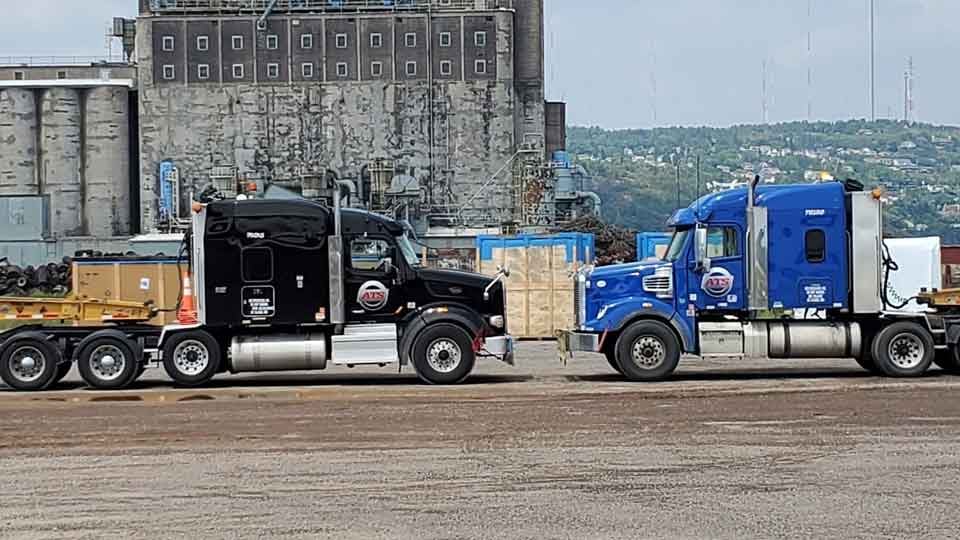
In this age of companies doing more and more in-house rather than relying on vendor partners to provide specialty services, many companies prefer to have a private fleet of trucks and drivers rather than outsourcing these services to a trucking company or freight brokerage.
For some companies, this makes sense. Maintaining a private fleet gives you ultimate control over where the trucks and drivers are at all times, and it saves the time it takes to find a truck for each load.
For other companies, it makes more sense to partner with a transportation provider to meet its trucking needs. This method eliminates the hassle of maintaining a fleet, and gives more flexibility for shipping different types of freight.
Of course, there’s the third option: Maintaining a private fleet and partnering with a transportation company for supplemental services, such as long hauls or over-dimensional freight.
Which should you choose? Anderson Trucking Service (ATS) has been in the trucking industry since 1955, and we’ve learned a lot about how different companies use trucking services. We’ll help you compare a private fleet and outsourced trucking services. With this information, you’ll be prepared to choose the best fleet for your business.
What Is a Private Fleet?
A private fleet is a company-owned and operated fleet of trucks. In most companies, this looks like a transportation department with employee drivers who drive and maintain the trucks. These trucks are used exclusively by your company for your freight (for example, deliveries from a warehouse to retail stores, or from a manufacturing facility to customers).
As the owner of the private fleet, you determine the type of trucks in your fleet (for example, you may have a fleet of dry van trailers) and the maximum length of haul. You are responsible for sourcing and maintaining your fleet, so understanding the advantages and disadvantages of having your own trucks will help you prepare.
Advantages of a Private Fleet
Most companies choose a private fleet because of five major advantages.
1. Fixed Costs
Generally, the costs of maintaining a fleet of vehicles are predictable. The day-to-day needs include:
- Truck payments
- Driver pay and benefits
- Insurance
- Routine maintenance
- Fuel
Maintaining a fleet gives you the opportunity to shop around on these services, and to find additional efficiencies when it comes to transportation. While you’re never fully in control of the marketplace, owning equipment and hiring your drivers allows you to make some choices.
Cost isn’t the only thing that companies prefer to control — especially when time is money.
2. Schedule Control
A dedicated fleet allows you to send trucks and drivers wherever they are needed, when they are needed. You may be able to prioritize one load over another, and pivot drivers to areas where they are most needed.
Schedule control is also a factor. If your trucks are typically running the same lanes regularly. This lets you predict the time needed for each load, and you can work with consignees to maximize your schedules.
While costs and scheduling both directly impact your bottom line, having in-house trucks can also lead to less direct benefits.
3. Training and Consistency
When you employ drivers, your company takes charge of their training and growth opportunities. While all drivers need CDL training, employers also provide soft skill training and can choose which goals to set for drivers.
4. Knowing the Driver and Lane
Employing drivers means there is no question who will show up at each location. Drivers know what’s expected of them (especially for routine trips), and consignees can get to know the person picking up or delivering their freight.
5. Branding
Seeing part of your fleet driving down the road keeps your brand name in the eyes and minds of consumers. Other drivers may not be able to literally look away from your logo and products as they are inscribed on the side of the vehicle.
For many companies, having a private fleet of trucks and drivers makes sense. For some companies, a private fleet isn’t a practical solution for their transportation needs.
Disadvantages of a Private Fleet
While having a private fleet comes with increased control over the trucks and drivers, they aren’t the solution for every company. Consider these seven disadvantages of operating a private fleet before making your final decision.
1. Significant Initial Investment
Building a private fleet requires buying trucks, hiring drivers, obtaining insurance and finding a place to park and maintain the trucks. This initial investment can run hundreds of thousands of dollars, in addition to the ongoing costs of maintaining a private fleet.
Keeping up with technology can also mean a significant cost. These costs might not be obvious when setting up a private fleet, but technology is a critical part of the trucking industry and these costs will make your trucks safer, compliant and efficient in the long run.
2. Regulatory Concerns
Managing a private fleet means you’re in charge of all aspects of transportation, including staying current on changing rules and regulations. Whether it’s managing Hours of Service regulations, new environmental restrictions or even customer complaints, you are responsible for keeping your fleet safe and compliant.
3. Ongoing Costs and Details
In addition to managing regulations, a private fleet means you’re responsible for day-to-day details like insurance, depreciation, fuel and risk management. If one or more of your trucks are involved in an accident or need unexpected maintenance, it’s difficult to cover their lanes with a small fleet.
4. Ongoing Overhead
As the employer, you’re required to pay your drivers consistently, regardless of how much work they’re doing. Due to slow periods, truck maintenance, winter storms, road construction or other reasons, trucks may not stay on the road. But you still have to pay your drivers, insurance and truck payments.
Trucking is a competitive industry, and it’s hard to hire and keep good drivers. If your drivers are consistently not able to meet their weekly driving goals and max out their Hours of Service, there is a good chance they will find another employer.
5. Unexpected Delays
In-house fleets rely on all trucks and drivers being available when needed. But when a truck requires unexpected maintenance or a flu sweeps through your driver ranks, you might not have the drivers you need when you need them.
It’s impossible to predict if or when this will happen (except to assume that it will happen at the least convenient time, of course). If your customers aren’t willing to wait for drivers to recover or a part to be installed on a truck, you need a back-up plan for when the unexpected happens.
6. Busy Seasons
A sudden spike in business is a welcome problem — but logistically, it means more freight needs to be moved right away. If your in-house fleet is sized to meet your usual business needs, you can’t disappoint your customers with delayed shipments right when they need them most.
7. Change in Business Needs
What happens when your business expands into new markets? Are your drivers prepared to drive in unfamiliar areas or potentially drive over the road for multiple days? Are your trucks prepared for the wear and tear of driving farther than usual? Do you even have the right type of truck for all your shipments?
These are some of the reasons companies choose to partner with a transportation company to outsource trucking services, or to supplement an existing fleet.
What Are Outsourced Trucking Services?
Outsourcing trucking services means partnering with a transportation provider to deliver all or some of your freight.
- Some companies may choose to outsource all of their transportation instead of keeping a private fleet.
- Companies with a private fleet may use a trucking company to supplement their existing fleet, similar to using a headhunter or staffing agency to supplement a recruiting team.
Just like we did for the private fleet, let’s consider the pros and cons of outsourcing trucking.
Advantages of Outsourcing Trucking Services
Whether you choose to outsource all or some trucking services, there are three advantages for your business.
1. Consistent Availability
Trucking companies maintain a diverse fleet of trucks and drivers. No matter how your needs change, they have a network of services they can provide — and they can use their experience to help find solutions you may not have considered. This can save significant time and stress during unexpected spikes or changes in business.
2. Predictable Billing
In the trucking industry, you are billed based on the distance traveled, type of freight and additional services. There are no additional costs for having the truck and driver ready when you need them. When your business needs change, there’s no need to pay for a fleet you are no longer using.
Whether you require just a few loads every year or several shipments per day, trucking companies charge only for the services you use.
3. Industry Knowledge and Experience
Reliable trucking companies are immersed in transportation every day. They have intimate knowledge of changing regulations, laws in different jurisdictions and how to maximize the efficiency of every load.
When you engage an experienced transportation company, you get the advantage of this hard-won wisdom, which may have unexpected consequences in both the long- and short-term — such as the option to use a different trailer type for your freight or fit more pallets in a dry van.
As a trucking company, we’d like to say that using a trucking company is all advantages and no disadvantages. But nothing is that straightforward. There are several drawbacks to outsourcing your transportation.
Disadvantages of Outsourced Trucking Services
Outsourcing trucking services isn’t for everyone. Here are two drawbacks for your consideration.
1. Variable Pricing
Purchasing any good or service means you are not in control of the price. Trucking services are no different.
Working with a trucking company means it sets the price for each load. You can choose contract or spot rate pricing, and there is some room for negotiation and comparison shopping, but ultimately you don’t have control over the price.
2. Limited Control
Outsourcing services means handing your freight over to a trucking company for delivery. You have limited control over the process. The trucking company chooses the driver and vehicle, and they may even change the route on the fly.
While you can expect regular updates throughout the process, you have less control than you would with your own fleet. If you choose to outsource trucking services, be sure to ask about tracking devices and what updates you can expect throughout the haul.
With these pros and cons of each system, you can decide if a private fleet or outsourced services make more sense for your business. There’s no one right answer…your needs are as unique as your business, and what works for others might not work best for you.
Outsourced vs. In-House Transportation: How to Compare
Making the decision to have transportation provided by an outside carrier or an in-house fleet can have a serious impact on your reputation and your business. Getting goods into the hands of your customers is one of the most critical services you provide.
Doing the research is the first step in making that choice. No matter which option you choose, making your supply chain as efficient as possible will benefit your business and your customers.
If you choose to outsource transportation, the Freight Carrier Selection Checklist can compare providers and find the right one for your business.
If you’re ready to talk, contact ATS.





